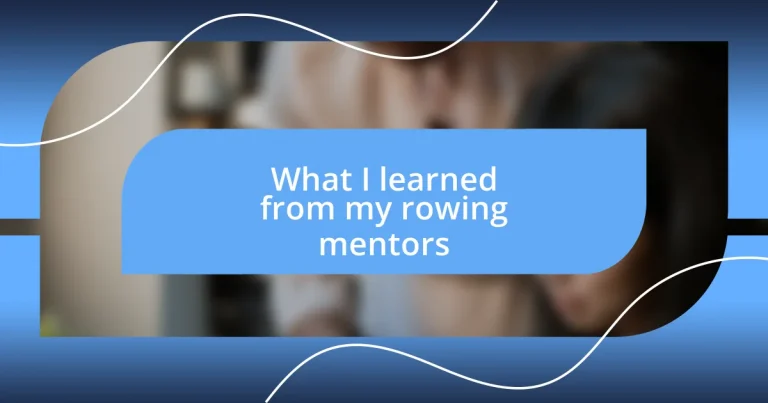Key takeaways:
- The importance of team dynamics is emphasized, showing how individual efforts impact the collective success in rowing and beyond.
- Effective mentors embody qualities such as empathy, patience, and adaptability, nurturing a supportive environment that fosters growth and resilience.
- Reflection and continuous learning are crucial for personal development, as mentors encourage embracing failures as opportunities for improvement.
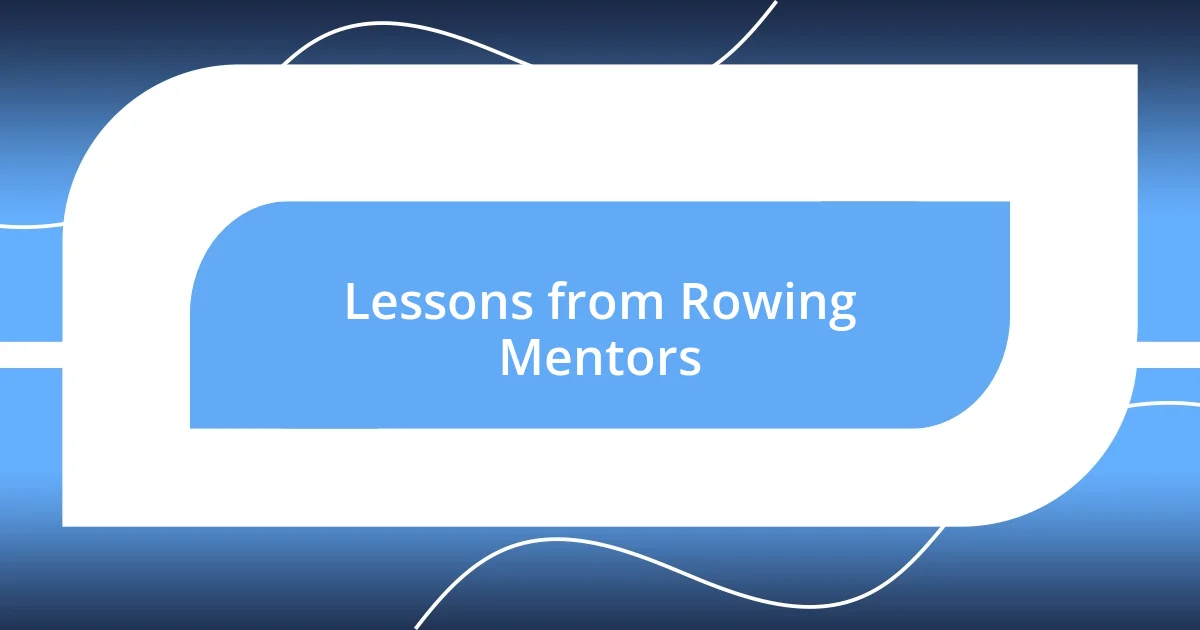
Lessons from Rowing Mentors
One of the most profound lessons I learned from my rowing mentors is the importance of team dynamics. Early in my rowing journey, I remember a particularly grueling practice where our coach made us row with only half the crew. It was tough, but it taught me how every individual’s effort affects the whole. Have you ever felt how the energy of one person can either uplift or hinder a group? Rowing reinforced that concept for me.
Another invaluable insight came during a challenging regatta when one of my mentors urged us to embrace failure as a stepping stone to success. There was a race we certainly should have won, but we fell short. Rather than scolding us, my mentor asked, “What did you learn today?” That reframing made me realize that setbacks are simply parts of our growth—an essential perspective that’s helped me in many other aspects of life.
Lastly, the discipline instilled by my mentors has shaped my approach not just to rowing, but to everything I pursue. I recall nights when I’d rather binge-watch a show than hit the gym. My mentor would often say, “It’s the discipline that creates champions.” That simple truth resonates deeply with me. How about you? What motivates you to stay committed, even when the couch calls?
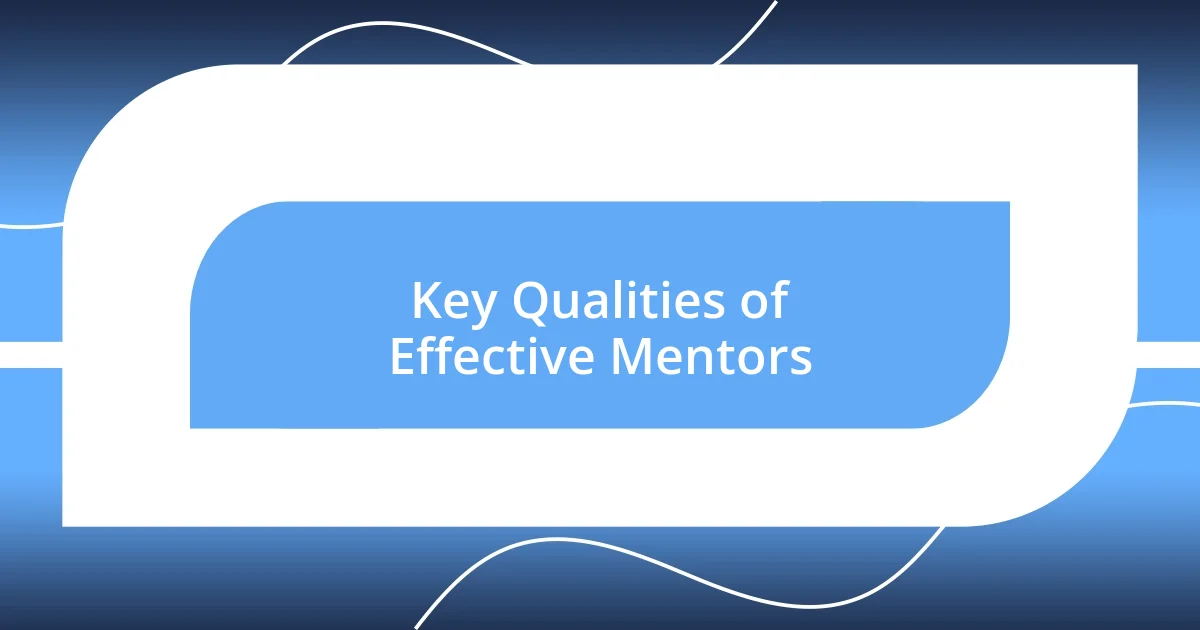
Key Qualities of Effective Mentors
Mentors stand out not just for their expertise but for the qualities that define them. I’ve seen effective mentors truly thrive in their roles when they embody qualities like empathy, patience, and resilience. For instance, during one early morning practice, I noticed how my mentor took the time to understand our individual struggles, whether it was balancing schoolwork with training or managing personal issues. This understanding fostered a safe environment where we felt supported, allowing us to push our limits.
Here are some key qualities I’ve observed in effective mentors:
- Empathy: They understand and resonate with the challenges of their mentees.
- Patience: They recognize that growth takes time and encourage gradual improvement.
- Adaptability: They adjust teaching methods to cater to different learning styles.
- Communication: They share insights clearly, fostering open dialogue.
- Inspiration: They ignite passion and motivate mentees to strive for their best.
I still remember the way my mentor guided us through difficult races. Rather than focusing solely on what went wrong, they helped us identify small victories along the way. This not only boosted our morale but also reinforced the belief that every step, no matter how small, is a part of the larger journey. This holistic approach to mentorship makes all the difference in nurturing a resilient mindset.
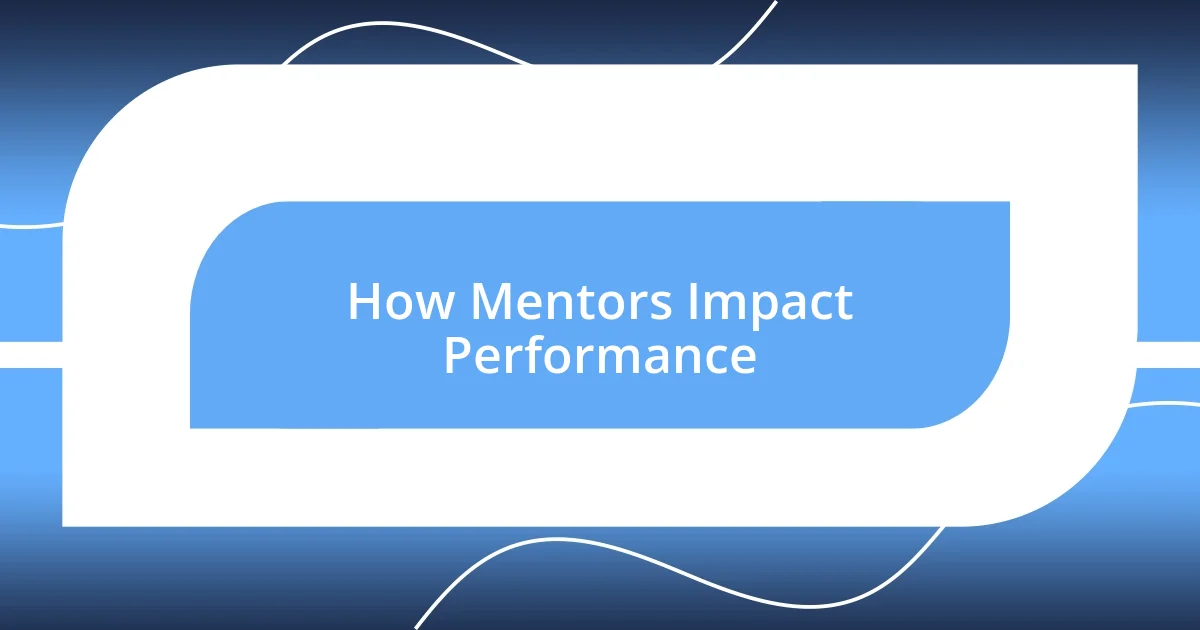
How Mentors Impact Performance
Mentors play a crucial role in enhancing performance, often serving as both guides and mirrors reflecting our potential. I distinctly remember one early morning when we barely made it through our warm-up rows. My mentor stood at the edge of the water, calmly reiterating our technique while reminding us that small adjustments could yield monumental results. That moment showed me how precise feedback can lift a team’s performance, prompting me to pursue constant improvement rather than perfection.
Additionally, the confidence imparted by mentors is immeasurable. During a particularly tough competition, I felt hesitant about my rowing abilities. My mentor glanced my way and offered a supportive nod, subtly instilling belief in my skills. That simple gesture transformed my nervous energy into determination. It perfectly illustrated how a mentor’s belief can empower us to perform at our utmost, even when self-doubt creeps in.
When I think back on my journey, I recognize that performance doesn’t only hinge on technical skill; it’s enriched by the emotional support mentors provide. There was a regatta where things went awry, and I was devastated. Rather than focusing on the loss, my mentor sought me out afterward to talk about the effort we’d put in, leading me through a reflection on our growth. This emphasis on emotional resilience not only softened the disappointment but allowed me to transform the loss into a learning experience for future races.
| Impact on Performance | Description |
|---|---|
| Technical Feedback | Helps to refine skills and improve overall rowing technique. |
| Confidence Building | Encourages self-belief which can directly translate into better performance. |
| Emotional Support | Provides the resilience to bounce back from setbacks and learn from experiences. |
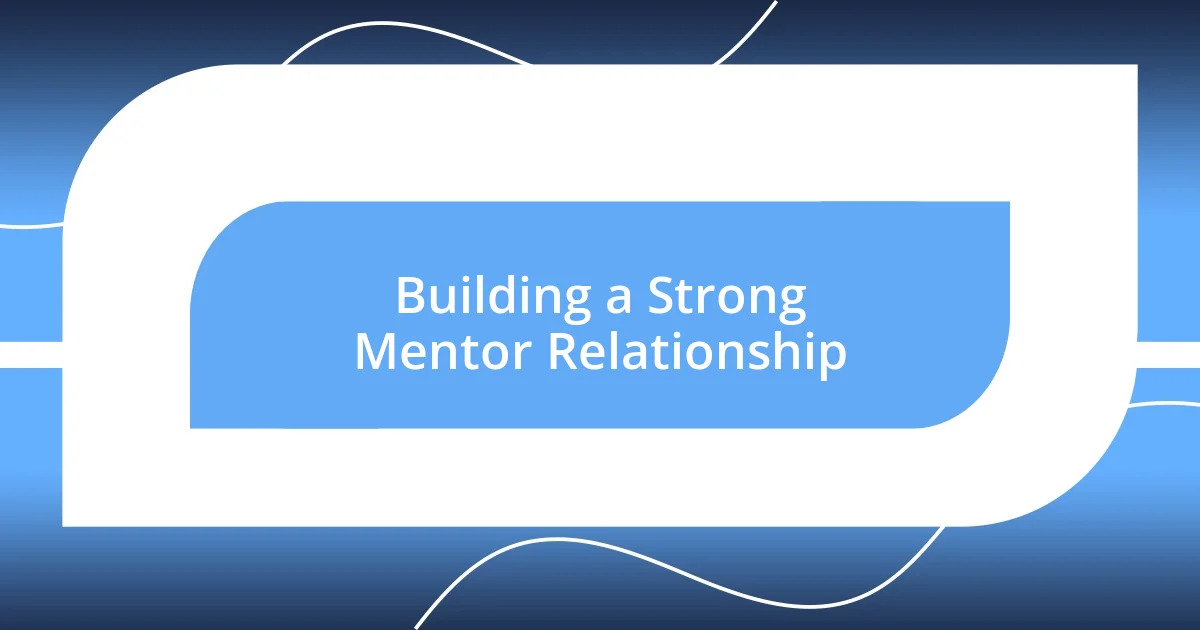
Building a Strong Mentor Relationship
Cultivating a strong relationship with a mentor requires trust and openness. I learned this firsthand when I started sharing my fears about competing. One morning, as we wrapped up practice, I took a deep breath and opened up about my anxiety before races. My mentor’s response was immediate and reassuring. They didn’t dismiss my feelings; instead, we talked candidly about everyone feeling pressure. This exchange showed me that vulnerability can deepen connections.
It’s also essential to approach mentorship as a two-way street. While I looked up to my mentor for guidance, I soon realized that my feedback mattered, too. During a particularly grueling training week, I shared my thoughts on adjusting our drills. My mentor listened carefully, which made me feel valued. I realized that effective mentorship thrives on collaboration, where both parties can learn and grow together. Have you ever considered how sharing your insights can strengthen your mentor relationships?
Finally, consistency and commitment go a long way in building a strong mentor relationship. I remember a period when my schedule was hectic, and I hesitated to reach out to my mentor. Yet, every time we met, their dedication shone through. They always made it a point to check in on my progress, showing me that genuine mentorship involves ongoing support, not just occasional meetings. This commitment instilled in me the importance of being present for those I mentor, creating a cycle of support that extends beyond personal connection.
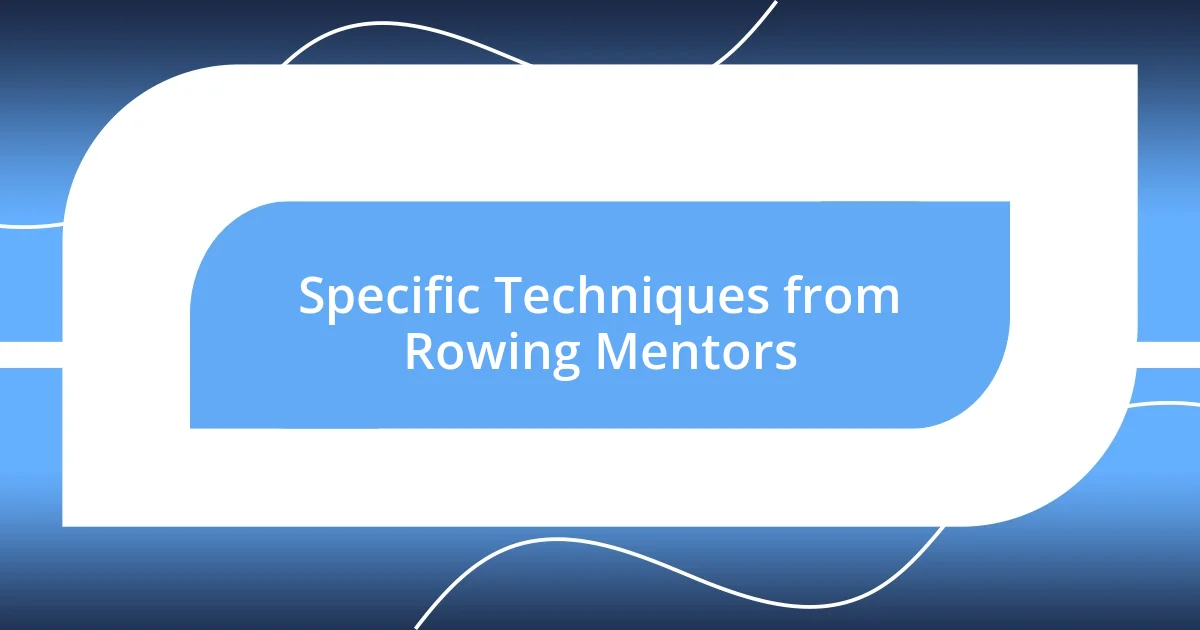
Specific Techniques from Rowing Mentors
The first technique that stands out from my rowing mentors is the focus on body positioning. I remember one practice where my mentor emphasized the importance of keeping an upright posture during strokes. It felt awkward at first, but once I practiced it consistently, I noticed how it significantly improved my power output and balance in the boat. Have you ever felt like a small tweak in technique made a huge difference? Trust me, it really can!
Another valuable lesson came during a drill designed to enhance our timing. My mentor had us row to a countdown, forcing us to synchronize our strokes. This seemingly simple exercise highlighted how easily timing can disrupt flow, a mistake I had been making unknowingly. I can still hear my mentor’s voice, reminding us to connect as a crew rather than just as individuals. This realization was a game-changer for our team dynamics and taught me the power of unity.
Lastly, my mentor often reminded us to visualize our technique before each practice. I distinctly recall a day when, feeling particularly off, I decided to embrace this tip. I closed my eyes and imagined each stroke, picturing the water flowing smoothly around the blade. To my surprise, when I got back in the boat, everything felt more fluid and controlled. This technique not only calmed my nerves, but it also reinforced the idea that mental preparation is as crucial as physical practice. Have you explored the power of visualization in your own routines? It’s worth a try!
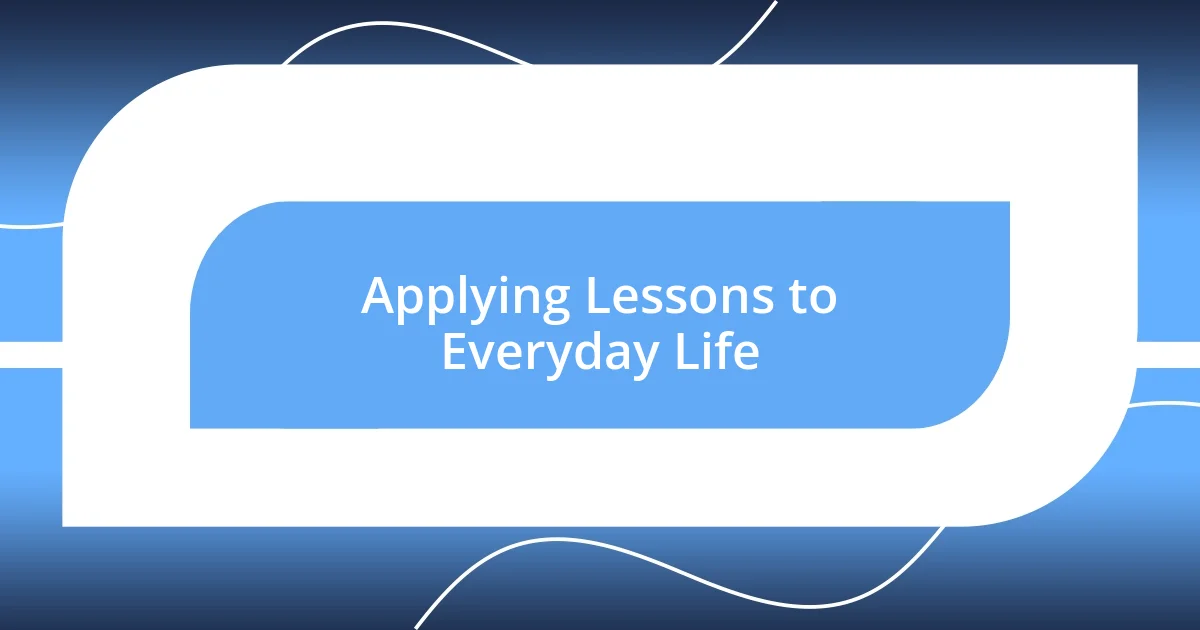
Applying Lessons to Everyday Life
When I reflect on the lessons from my rowing mentors, I find that the principle of resilience is applicable in so many aspects of life. There were days I struggled with strokes, feeling frustrated and ready to give up. My mentor would remind me that every setback is an opportunity to grow, encouraging me to push through those tough moments. This mindset has become essential, reminding me that challenges outside of rowing—like work or personal relationships—require the same grit and determination. Have you ever noticed how resilience can reshape your approach to difficulties?
Another lesson that resonates with me is the power of teamwork. During a challenging regatta, I saw how our ability to work seamlessly as a crew led to our success. My mentor often said, “It’s not about individual glory; it’s about the effort we put forth together.” This mantra sticks with me today, especially when collaborating on projects or even in family gatherings. That sense of collective support fosters an environment where everyone thrives. Have you experienced that shift when focusing on the group rather than the individual?
Lastly, the concept of reflection became a cornerstone of my daily routine. After each practice, I would jot down what worked and what didn’t, something my mentor insisted upon. This habit has evolved beyond rowing; now, I take time each evening to review my day. By recognizing my accomplishments and areas for improvement, I not only grow but also cultivate a more positive mindset. Isn’t it interesting how a simple act of reflection can pave the way for personal growth in various facets of life?
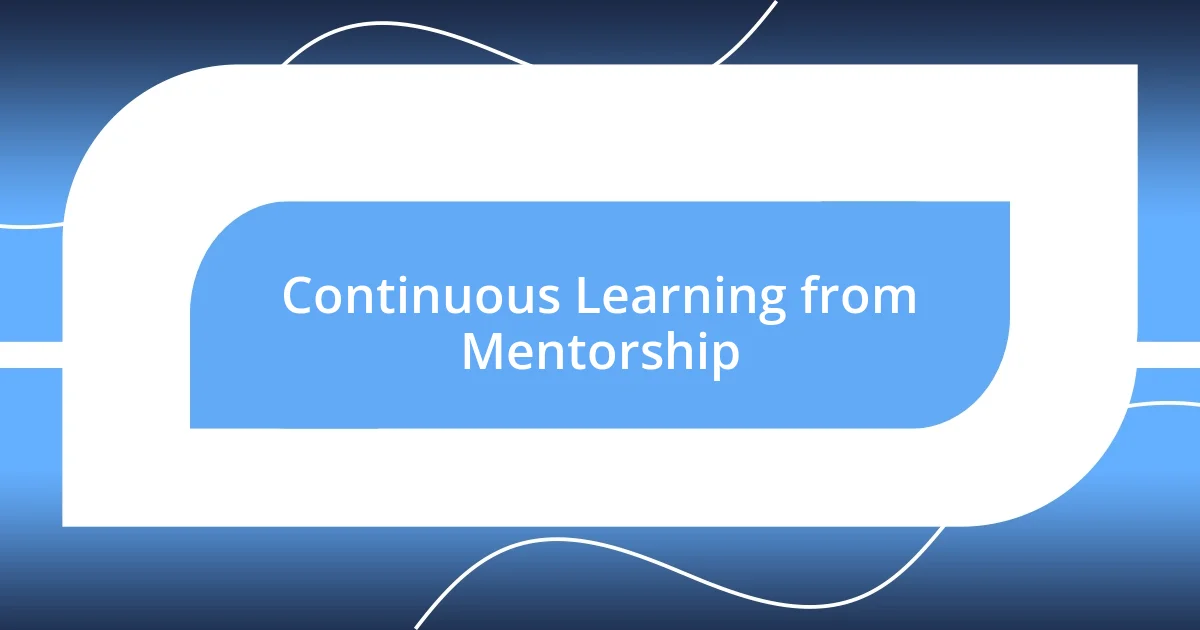
Continuous Learning from Mentorship
Mentorship creates a unique environment for continuous learning, and I’ve often found myself reflecting on how my rowing mentors fostered this. One rainy Saturday, I remember sitting with my mentor discussing our techniques and areas for improvement. He shared insights based on his long experience, but what truly struck me was his openness about his own learning journey. It made me realize that mentorship isn’t just about teaching; it’s about discovering together and being vulnerable in the process. Have you ever had a mentor share their mistakes? It can be so refreshing and enlightening.
Listening to my mentors always felt like unwrapping a series of gifts, each one filled with knowledge I didn’t know I needed. During one particularly tough training, when I was frustrated with my progress, my mentor encouraged me to embrace failure as a guidepost. Instead of shying away from my mistakes, I learned to analyze them and find lessons hidden within. This shift in perspective, focusing on growth rather than perfection, turned each setback into an opportunity. Can you recall a time when a failure turned into your greatest lesson?
Moreover, I discovered that learning never stops, as my mentors continuously sought new ways to improve their coaching. I vividly remember a time when our team was introduced to new contemporary drills. It required adaptability from everyone, including our mentors. Their willingness to learn from others inspired me to take risks in my own training—sometimes trying unconventional techniques or seeking feedback from peers. This openness sparked curiosity within me about my own potential. Have you explored new avenues in your journey, perhaps driven by mentorship, that reshaped your approach to learning?












